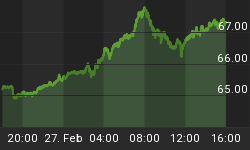John Taylor, economics professor at Stanford University, spoke to Bloomberg Television's Trish Regan today and said that the U.S. "could get into a situation like Greece, quite frankly."
Taylor went on to say, "People have to realize it is a precarious situation. The debt is going to explode if we don't make some changes."
Taylor on the U.S. economy:
"We have to get away from all these temporary things--rebates, monetary policy, quantitative easings, we have to get back to a strategy like we had in the 1980s--monetary policy and fiscal policy. I believe that will get the strong growth. The growth in the early 80s was 5.9% compared to 2.4% we've had in this recovery. There is a lot of evidence that that kind of policy works. Steady as you go, getting the tax rates down and keeping it there, not doing all of these temporary stimulations.
"We could get into a situation like Greece, quite frankly. People have to realize it is a precarious situation. The debt is going to explode if we don't make some changes. What seems to be more important is that people can get back on track, the country can get back on track, with just some sensible adjustments. I argue just bring spending back to where it was in 2007. That's not so long ago. We've had an enormous spending binge in the last few years. If we undo that binge, shouldn't be that hard, we can get back to some sensible pro-growth policies.
On whether the Fed's zero interest rate policy is helping to contribute to the deficit:
"I think it's contributing to the slow recovery because the Fed has bought so much of the debt that people don't know how they're going to undo that. They pledged to have interest rates at zero until 2014, but people are saying how can they possibly do that when the economy picks up. This uncertainty had lead people to sit on all this cash. I think if the Fed gets back to the policy that worked pretty well in the '80s and '90s, we would be in much better shape.
On Greece:
"A walk away would be a default. Nobody wants to do it at this point. The best thing is for the creditors to do as much as they can in conjunction with the Germans and the IMF is there too - to get a deal for Greece so that Greece can grow. Some of these GNP ideas are good, and that way, we get this behind us. They have been kicking the can down the road for years. That's a problem.
On whether credit holders are being unrealistic:
"It's a bargaining. Each side will try to get the best they can. The creditors are arguing that there is going to be contagion. If they don't do a better deal, the Greeks will argue and say hey, we're flat on our back, we have to get some growth. I think the Greeks have an issue here - if they can put in some good economic growth plans that get the economy moving and write down the debt even further. I think that that is the answer to this. It's really how Europe can get back on a growth track."
On U.S. entitlement programs:
"Right now, the entitlement spending is expected to grow way beyond something that anybody expects to be realistic. We just have to contain that growth. In other words, keep the spending from growing even further as a share to GDP. We do that in a way where we use the markets, the rule of law and incentives, it will be a better system. Some proposals out there to reform Medicare, Medicaid and keep spending down will lead to better health care. That is what we should be striving to do.















